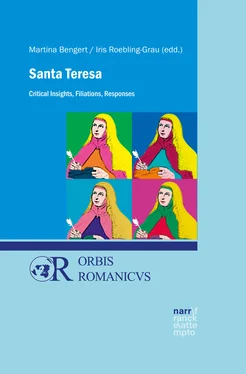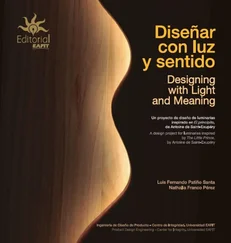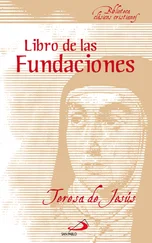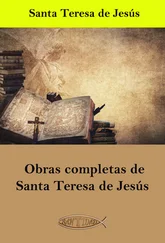In the medical discourse of the nineteenth century, Teresa figures among the most prominent hysterics. Especially in Spanish realist and naturalist literature, she is referred to as an almost dangerous influence on her readers. JUTTA WEISER examines La Regenta by Clarín and El cura by López Bago and shows how, by reading Teresa’s The Book of Her Life , the main characters are drawn to questionable forms of piety and even, in the case of El cura , incestuous fantasies and behavior. Clarín remains in the realm of allusion, whereas López Bago uses direct and unvarnished vocabulary mirroring the sometimes dismissive medical discourse.
JENNY HAASE turns to the late works of Anna de Noailles (1876–1933), an enigmatic figure in the literary circles of Paris. Her reflections on love, published as “Poème de l'amour” (1924), give voice to a boundless desire that is both a source of inspiration for her own writing as much as it is a reflection of her endless search for an elusive other. Similar to Teresa’s search for God, Noailles conceives the discourse on love as a self-practice aimed at forming and refining the subject. Alongside establishing this crucial connection with early modern female mysticism, Haase also exposes the radical metaphysical doubt that pervades Noailles’ poetry – a poetry of the twentieth century that is the work of a “mystic without God”.
DENISE DUPONT’s contribution focuses on the Homenaje literario a la gloriosa doctora Santa Teresa de Jesús en el III centenario de su beatificación – a collection of texts from 1914 that has its source in the Spanish tradition of the veneration of saints. She discusses the ways in which the Homenaje essays draw on Teresa as the organizing principle in establishing a different response to the questions raised by modernism. In addition, she highlights the convergence of theological debate with a vision of the Spanish nation in the postcolonial era and shows how Teresa’s humility, charity, faith, and intellect make her an inspiring role model for healing and growth.
MARTIN BAXMEYER’s contribution examines Franco’s aggressive instrumentalization of the myth of Santa Teresa during the Spanish Civil War (1936–1939) and its immediate aftermath by comparing it with another similarly instrumentalized myth: the myth of Our Lady of the Pillar. While Franco’s regime glorified both women as the strong and unapproachable matrons of the Spanish nation, Baxmeyer shows how the anarchist opposition recast them, and Our Lady of the Pillar in particular, as caring mother figures and thus undermined the ‘new’ Francoist myth of Santa Teresa, which misappropriated the early modern feminist as a symbol of its fascist, anti-feminist politics of violence.
In her contribution, MARTINA BENGERT analyzes the fictional north Mexican city of Santa Teresa in 2666 – the magnum opus of Chilean novelist Roberto Bolaño (1953–2003) – as a ‘non-place’ whose topography is constituted by the ongoing discovery of dead bodies. She then reads this urban body emerging from the murder of hundreds of female victims as the result of brutal processes of cartographic inscription upon these female bodies. While the pain that St. Teresa experiences upon being impaled by a cherub’s arrow leaves behind the trace of an encounter with God, in Bolaño’s text misogyny and femicide are woven into the very fabric of the city’s name, bringing the impalements suffered by the murdered women into an irresolvable tension with mystical transverberation.
Julia Kristeva’s extensive book Thérèse, mon amour (2005) is one of the most prominent responses to Teresa within current academic discourse. The French literary critic and psychoanalyst reads the saint’s word starting with an analysis of our modern post-secular society. As RACHEAL FEST points out, this reading propagates a new humanism that takes into consideration a modern need to believe beyond the classical framework of Catholic religion. For this new stream, Teresa is Kristeva’s referee, but instead of only annotating Kristeva’s ideas, Fest reads her essay against the grain and discovers problematic anti-Muslim tendencies.
DEVIN ZUBER presents Marina Abramović’s performance The Kitchen – Homage to Saint Therese as a kind of manual for spiritual discipline. He proposes an interpretation of Teresa of Ávila’s writing through the lens of Marina Abramović’s radical performance art. Both stylize their bodies as tools for entering altered states of consciousness, creating experiences within their respective “performances” that blend spiritual ecstasy with searing bodily pain. In doing so, they turn toward the pictorial in order to amplify this “incommensurability” of their bodies-as-signifiers, creating an excess that points beyond the body as a vector for spiritual illumination.
Taking Teresa’s accounts of her mystical experiences as their point of departure, ELISABETH PETROW and TORSTEN PASSIE examine the genesis of Teresa’s ecstasies and transverberations from a medical point of view, arguing that her experiences must be seen in connection with the long-term effects of a meningitis infection caused by neurobrucellosis. In light of the many other severe illnesses Teresa faced over the course of her lifetime, Petrow and Passie refrain from pathologizing her accounts. Instead, they highlight Teresa’s remarkable resilience and, linked to it, underscore the opportunity to achieve wholeness through illness.
The last essay in Spanish by the Argentine-French author and journalist ALICIA DUJOVNE ORTIZ can be considered a personal response to the mystic: “Letras del cielo”, finally, is a literary essay in which Dujovne Ortiz reflects on her 2012 novel Un corazón tan recio and creates a fictional context in which she encounters Teresa. This encounter culminates in an identification with Teresa as a strong woman: as a feminist, as a businesswoman, as a traveler, as a woman who speaks about her experiences, and who is (also) rooted in Jewish culture.
Yet, as always, there still remain questions. Devin Zuber, one of the authors of our essay collection, has addressed four such questions to the artist Marina Abramović. We are grateful to present this conversation in lieu of a closing remark at the end of the volume.
Through these multiple perspectives we aim to present different answers to the question as to why and how Teresa, “la más universal de nuestras escritoras”1, could be connected to so many different contexts.
In contrast to Cinco Siglos de Teresa , the rich volume of contributions published in 2016, the present collection does not investigate the contemporary Spanish contexts in which Teresa is read, nor does it limit itself to tracing Teresa’s influence on the Carmelites, or on theology or philology at large. Instead, its aim is to foster genuinely interdisciplinary scholarship that encourages encounters between psychology, cultural studies, art history, art, and religious studies. Our main impetus is to exploit the tensions created by contrasting standpoints: Gerold Necker, for instance, believes the spiritual influence of Judaism represents only a minor influence in Teresa’s work, whereas Alicia Dujovne Ortiz suggests that it plays a major role. Michael Plattig O.Carm. explores how Edith Stein’s interest in Teresa’s works sparked her inner resistance, while Martin Baxmeyer traces how Teresa was instrumentalized by Franco’s fascist regime. It is precisely the friction caused by these and other contrasting approaches to Teresa’s life and works that promises to give way to productive readings to a saint and mystic who carried within herself multiple dualities – dualities that she was able to accommodate as she progressed through life.
Multilingualism, diversity and German punctuation
Читать дальше












